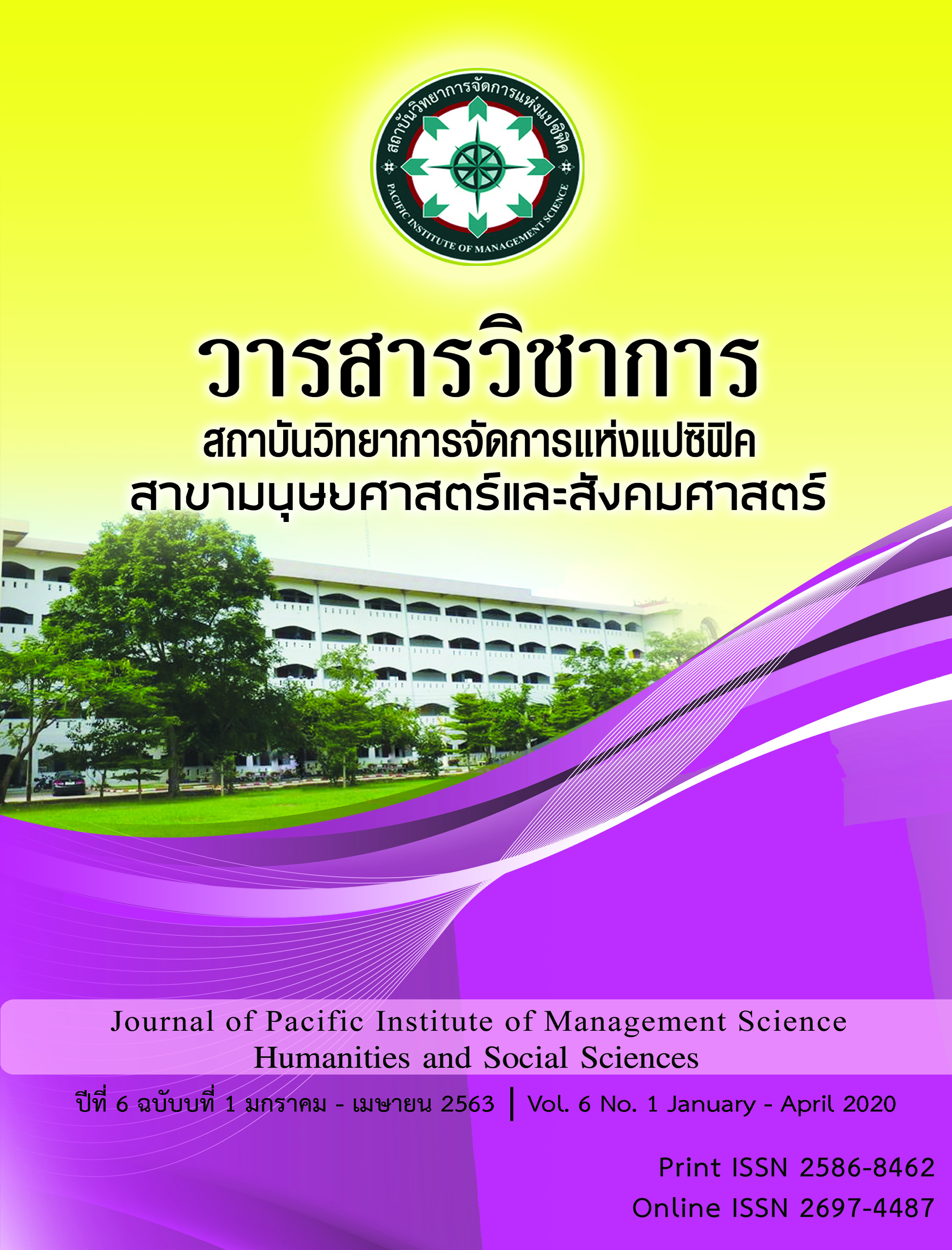THE INFLUENCE OF DIGITAL MEDIA TO BRAND TRUST, WORD OF MOUTH, BRAND PREFERENCE AND BRAND AWARENESS OF A PRIVATE UNIVERSITY IN CHONBURI PROVINCE
Keywords:
Digital media, Brand awareness, Word of mouth, Brand preference, Brand trust, A private universityAbstract
The objectives of this research were; 1) to study the level of brand trust, word of mouth, brand preference and brand awareness of one of a private university in Chonburi province 2) to compare the level of brand trust, word of mouth, brand preference and brand awareness of one of a private university in Chonburi province classified by demographic factors and 3) to study the level of influence of digital media elements of brand trust, word of mouth, brand preference and brand awareness of one of a private university in Chonburi province. This research is a quantitative research method. The samples were 270 bachelor degree and master degree students of a private university in Chonburi province. The results of 1) the level of brand trust, word of mouth, brand preference and brand awareness of one of a private university in Chonburi province, all above are in high level side of result. 2) demographic factors of age, education of influence of digital media elements of brand trust. Demographic factors of age, income, education of influence of digital media elements of brand awareness. Demographic factors of income, education of influence of digital media elements of brand awareness of one of a private university in Chonburi province. 3) the level of influence of digital media elements of brand trust, word of mouth, brand preference and brand awareness of one of a private university in Chonburi province in statistical significance .05
References
เคียงชนก บุญสุวรรณ. (2558). ปัจจัยที่มีอิทธิพลต่อการจดจำและการรับรู้ตราสินค้า/ บริการผ่าน
โฆษณาบนเกมออนไลน์ของประชากรในจังหวัดกรุงเทพมหานคร. การค้นคว้าอิสระ (บธ.ม.) บัณฑิตวิทยาลัย มหาวิทยาลัยกรุงเทพ.
จิตติมา จารุวรรณ์. (2551). พฤติกรรมและปัจจัยสำคัญที่มีต่อการซื้อผลิตภัณฑ์ของผู้บริโภคจากการ
สื่อสารการตลาดในรูปแบบสื่อสังคมออนไลน์. วารสารปัญญาภิวัฒน์ Vol 3 No 2 (2012):
JANUARY – JUNE.
ณฐวัฒน์ คณารักสมบัติ. (2557). การรับรู้สื่อประชาสัมพันธ์ของนักศึกษาที่มีผลต่อการตัดสินใจเข้า
ศึกษาต่อในมหาวิทยาลัยราชภัฏธนบุรี สมุทรปราการ. วารสารราชภัฏลำปาง Vol 6 No 1 (2017): มกราคม – มิถุนายน 2560.
นุชจรินทร์ ชอบดำรงธรรม. (2553). อิทธิพลของสื่อโฆษณาใรเครือข่ายสังคมออนไลน์ที่มีผลต่อ
กระบวนการตอบสนองของผู้บริโภค. หลักสูตรปริญญาบริหารธุรกิจมหาบัณฑิต สาขาการตลาด มหาวิทยาลัยศรีนครินทร์วิโรฒ.
บุหงา ชัยสุวรรณ, (2558) การสื่อสารการตลาดผ่านสื่อสังคม: ภาพรวมและกรอบแนวความคิด. วารสาร
นิเทศศาสตร์และนวัตกรรม นิด้า,2,173-198.
วิภาดา พิทยาวิรุฬห์ และ ณักษ์ กุลิสร์. (2557). สื่อดิจิทัลที่มีอิทธิพลต่อการตอบสนองของผู้บริโภคใน
การเข้าถึงข้อมูลทางการตลาด. วารสารบริหารธุรกิจศรีนคริทรวิโรฒ ปีที่ 5 ฉบับที่ 1.
ศิริวรรณ เสรีรัตน์และคณะ (2550). พฤติกรรมผู้บริโภค. กรุงเทพฯ: พัฒนาศึกษา.
Angella J. Kim and Eunju Ko. (2012). Do social media marketing activities enhance customer equity?
An empirical study of luxury fashion brand. Journal of Business Research 65(2012) 1480-1486.
Bruno Godey, AikateriniManthioua, Daniele Pederzoli , Joonas Rokka , Gaetano Aiello , Raffaele
Donvito , Rahul Singh. (2016). Social media marketing efforts of luxury brands: Influence on
brand equity and consumer behavior. Journal of Business Research. 9.
Fariborz Rahimnia and Jaleh Farzaneh Hassanzadeh. (2013). The impact of website content
dimension and e-trust on e-marketing effectiveness: The case of Iranian commercial saffron
corporations. Journal Information & Management 50 (2013) 240–247.
Heaney, J-G., Heaney, M.F . (2008), “Services brandimg strategies: using corporate branding to
market educational institutions”, paper presented at the Academy of World Business,
Marketing and Management Development, Rio de Janeiro.
Yamane, Taro.1973. Statistics: An Introductory Analysis. Third edition. Newyork : Harper and
Row Publication.
Downloads
Published
Issue
Section
License
บทความที่ได้รับการตีพิมพ์เป็นลิขสิทธิ์ของ สถาบันวิทยาการจัดการแห่งแปซิฟิค
ข้อความที่ปรากฏในบทความแต่ละเรื่องในวารสารวิชาการเล่มนี้เป็นความคิดเห็นส่วนตัวของผู้เขียนแต่ละท่านไม่เกี่ยวข้องกับสถาบันวิทยาการจัดการแห่งแปซิฟิค และคณาจารย์ท่านอื่นๆในสถาบันฯ แต่อย่างใด ความรับผิดชอบองค์ประกอบทั้งหมดของบทความแต่ละเรื่องเป็นของผู้เขียนแต่ละท่าน หากมีความผิดพลาดใดๆ ผู้เขียนแต่ละท่านจะรับผิดชอบบทความของตนเองแต่ผู้เดียว







